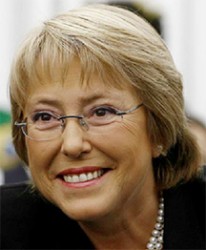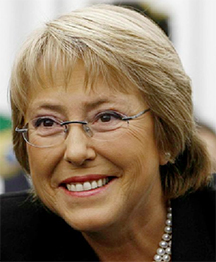SANTIAGO (Reuters) – Michelle Bachelet looked in the pole position to become Chile’s president again, but was falling short of the votes needed to avoid a December runoff.

A partial official count yesterday had her leading with 45.1 percent of votes.
Evelyn Matthei, the candidate for the governing right-wing Alianza coalition, was at 24.8 per cent, according to the national electoral service Servel’s projection with 6.5 per cent of all votes counted. Seven other candidates were counted at 11.9 per cent or less.
Outright victory requires at least 50 per cent of the votes – something that has not happened in 20 years. Otherwise, the two top contenders will go head to head on Dec. 15.
Pollsters and political analysts believe Bachelet would easily win a runoff against Matthei, with supporters of the minor candidates expected to back Bachelet or abstain.
The centre-left Bachelet has promised to tackle deep inequality in Chile by improving education, a need that has led to loud demonstrations in recent years. She also wants to upend a constitution that dates back to Augusto Pinochet’s 17-year dictatorship.
Chile’s free-market economy and rapid copper-fueled growth have made it a Latin American success story during the last two decades. It has made enormous headway toward eradicating poverty but still has work to do to join the ranks of developed countries.
Bachelet, who held the presidency from 2006 to 2010, was constitutionally barred from seeking immediate re-election after her first term, but left office enjoying extremely high popularity.
Political stalemate and her own inexperience stymied her ability to push through all the reforms she wanted in her first administration. Those in her circle, however, think there is more room for manoeuvre this time.

